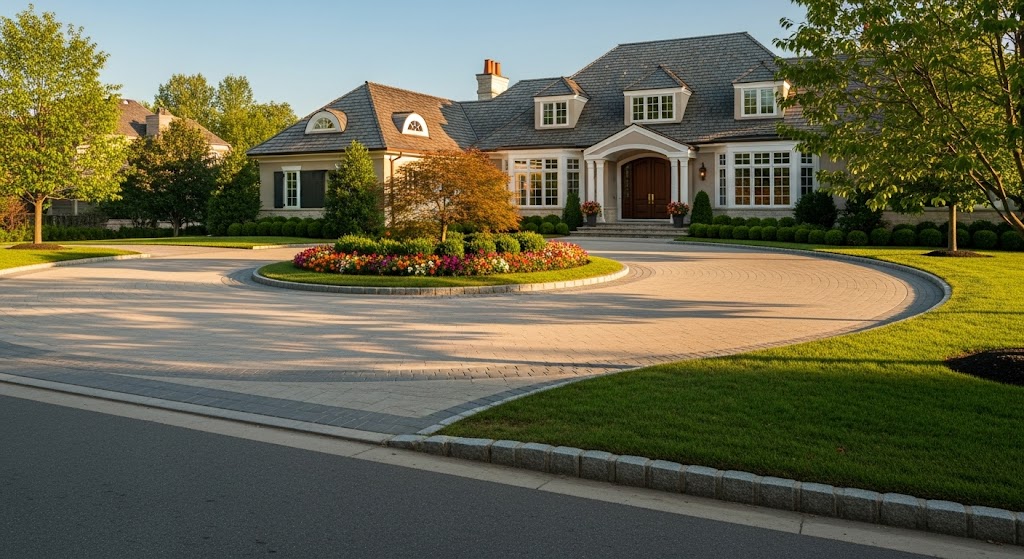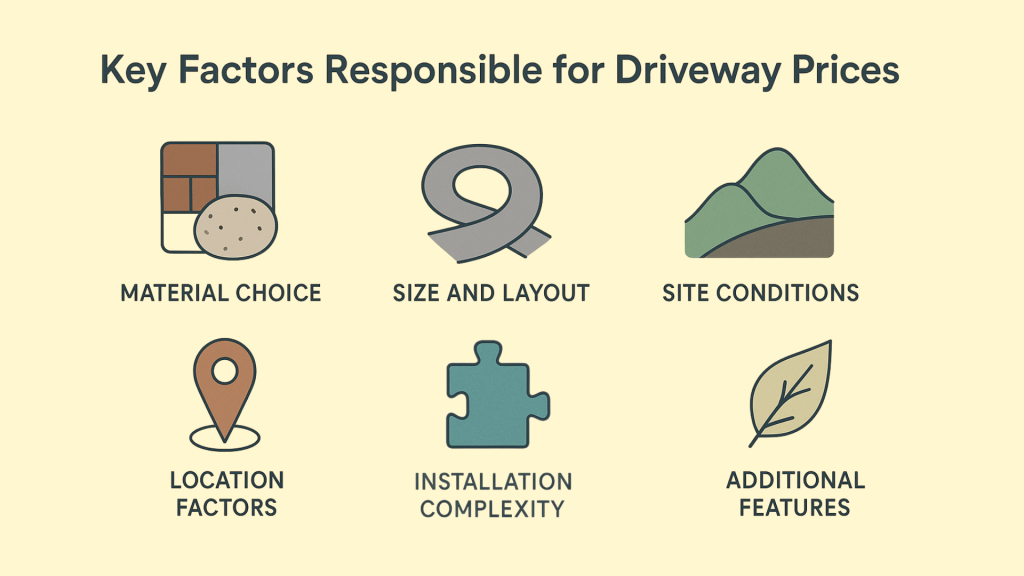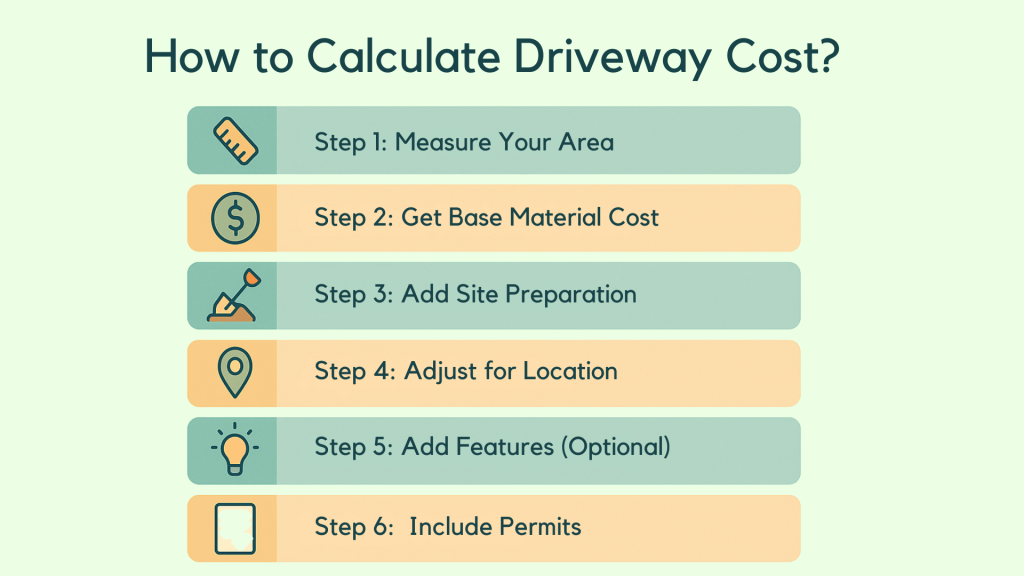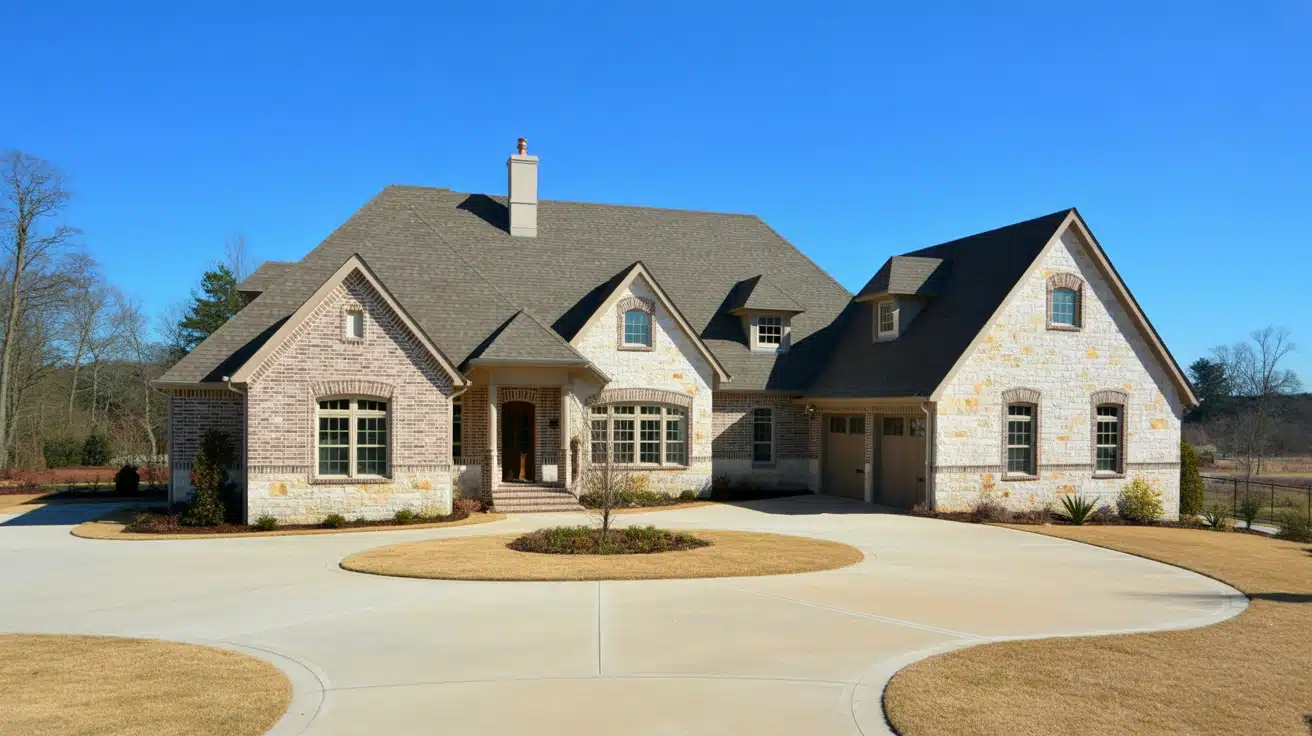Circular Driveway Cost Guide: Prices, Factors, Math
Planning a circular driveway sounds like a smart move for your home’s entrance. You want the convenience of easy traffic flow and that polished look that makes neighbors stop and stare.
But the big question hitting your wallet is simple: What will this cost you? Most homeowners face sticker shock when they start getting quotes.
Material choices, size requirements, and local labor rates can swing your total investment anywhere from a few thousand to well over twenty thousand dollars. The math behind these estimates can also be confusing.
You’ll get a clear breakdown of circular driveway pricing across different materials and sizes. We’ll walk through the key factors that drive costs up or down, plus show you exactly how contractors calculate their estimates.
By the end, you’ll know what to expect and how to budget smartly for your project.
What Counts as a Circular Driveway?

A circular driveway creates a loop that connects to your main road or street at two points. Cars can enter from one end and exit from the other without needing to back up or turn around.
This loop design sets it apart from straight driveways that dead-end at your garage.
The key features include:
- Two connection points to the street or main access road
- Continuous curved path that forms a complete or partial circle
- Central area that can house landscaping, fountains, or remain open
- Smooth traffic flow in one direction around the loop
You’ll find several variations of circular driveways that adapt to different property sizes and layouts. Some homes feature horseshoe designs that curve around gracefully, while others opt for teardrop shapes.
The size can range from compact designs for smaller lots to grand sweeping curves on larger estates.
Quick Driveway Price Snapshot (USA)
Here’s what you can expect to pay for different circular driveway materials and sizes across the United States. These ranges reflect typical contractor pricing as of 2025.
| Material | Small (800–1,200 sq ft) | Medium (1,200–1,800 sq ft) | Large (1,800–2,500 sq ft) |
|---|---|---|---|
| Gravel | $800–$3,600 | $1,200–$5,400 | $1,800–$7,500 |
| Asphalt | $2,400–$8,400 | $3,600–$12,600 | $5,400–$17,500 |
| Concrete | $4,800–$14,400 | $7,200–$22,500 | $10,800–$30,000 |
| Pavers | $8,000–$24,000 | $12,000–$36,000 | $18,000–$45,000 |
| Natural Stone | $12,000–$30,000 | $18,000–$40,000 | $25,000–$50,000 |
- Note: Natural stone costs are typically at the upper end of paver costs, often exceeding them for larger and more intricate designs.
Important notes about these numbers:
Labor costs vary significantly by region. Southern states often offer more competitive pricing due to lower labor rates.
Site preparation adds extra costs. If your property requires grading, drainage work, or tree removal, you can expect to add a few thousand dollars to the base prices. Steep slopes or difficult access can push preparation costs even higher.
Permit fees range from $50-$500, depending on your local requirements. Some areas require engineering plans for circular driveways, which adds $500-$1,500 to your total project cost.
Factors Responsible for Circular Driveway Prices
Understanding what drives circular driveway costs helps you make smart budget decisions. Often these led to different outcomes for anyone’s budget.

Below are the main factors with detailed information that will impact your final price of building a circular driveway:
1. Material choice: Your material selection makes the biggest impact on total cost. Gravel runs $3-6 per square foot but needs ongoing maintenance. Concrete costs $5-10 per square foot with minimal upkeep. Premium materials like pavers cost $8-15+ per square foot.
2. Size and layout: Square footage drives material costs directly. An 800 square foot driveway needs far less material than a 2,000 square foot design. Complex curves cost more due to skilled labor requirements.
3. Site conditions: Level sites keep prep costs low. Sloped properties need excavation and may require retaining walls. Clay soil needs special handling, while rocky terrain increases equipment costs.
4. Location factors: Urban areas charge 20-40% more than rural locations. Remote areas face higher delivery charges. Local permits can add $500-2,000 to your project cost.
5. Installation complexity: Simple circular loops cost less than elaborate designs. Adding borders or integrating with existing landscaping increases labor time substantially.
6. Additional features: Common upgrades and their costs:
- Lighting systems: $2,000-5,000
- Drainage solutions: $1,000-3,000
- Center island landscaping: $500-2,500
- Decorative concrete options: +$2-5 per square foot
Step-by-Step Driveway Cost Calculator
Calculating the cost of building a circular driveway can be both easy and tricky. You need to go through various steps to ensure it is done according to your needs.

Calculate your circular driveway cost using this simple method. Follow each step to get an accurate estimate for your project.
Step 1: Measure Your Area
Calculate the total square footage of your planned circular driveway. For a basic circle, use this formula:
Area = π × radius²
For more complex shapes, break them into sections and measure the outer circle area, then subtract any inner landscaped areas if applicable. Add any connecting straight sections to get your total square footage.
Step 2: Get Base Material Cost
Multiply your square footage by your chosen material cost per square foot. Check the pricing table above for current rates based on your preferred material choice.
Example calculation: 1,200 sq ft × $6 (concrete) = $7,200 base cost
Step 3: Add Site Preparation
Add site preparation costs based on your property conditions. These percentages cover excavation, grading, and base preparation work:
- Level ground: Add 15% to base cost
- Moderate slope: Add 25-35% to base cost
- Steep slope or poor soil: Add 40-60% to base cost
Example: $7,200 × 1.25 (moderate conditions) = $9,000
Step 4: Adjust for Location
Apply regional multipliers to account for local labor costs and market conditions:
- Rural areas: Use base calculation
- Suburban areas: Add 10-20% to total
- Urban areas: Add 20-40% to total
Example: $9,000 × 1.15 (suburban area) = $10,350
Step 5: Add Features (Optional)
Calculate costs for any additional features you want to include (see factors above).
Step 6: Include Permits
Most areas require permits for circular driveways. Budget for:
- Basic permits: $50-$500
- Engineering plans (if required): $500-$1,500
- Inspection fees: $100-$300
- Total permit costs: $50-$500, depending on local requirements
Final Calculation Example
Using our running example:
- Base material cost: $7,200
- Site preparation (25% extra): $1,800
- Location adjustment (15% extra): $1,350
- Optional features: $2,000 (basic lighting)
- Permits and fees: $200
Total estimated cost: $12,550
| Quick Formula
Total Cost = Square Footage × Material Cost × 1.5 The 1.5 multiplier covers average prep work and labor costs. |
Ways to Save While Building a Driveway
Building a circular driveway doesn’t have to break your budget. Here are four proven ways to cut costs without compromising quality:
1. Pick budget-friendly materials: Gravel costs 40-60% less than concrete while still providing good functionality. Asphalt offers middle-ground pricing with decent longevity.
2. Time your project strategically: Schedule installation during off-peak season (late fall or winter). Many contractors offer 10-20% discounts when demand is lower.
3. Handle basic prep work yourself: Clear vegetation and remove debris if you have the tools. This can save $1,000-3,000 in labor costs while letting professionals handle technical grading.
4. Add features gradually: Start with basic installation and add lighting or landscaping later. This spreads costs over time and lets you focus on essentials first.
|
Note All cost and value figures mentioned are estimates. Actual prices may vary depending on your location, property conditions, and contractor rates. Please consult local professionals for accurate quotes. |
Conclusion
Your circular driveway investment now has clear numbers behind it. From gravel at $2,400 for small projects to premium stone reaching $37,500 for large installations, you understand exactly where your money goes.
The step-by-step calculator puts you in control of estimating costs before talking to contractors.
Smart timing and material choices can slash thousands from your total bill. Whether you start with basic asphalt or opt for premium pavers, you’re equipped to make informed decisions that fit your budget.
Ready to change your entrance? Use these pricing insights to get accurate quotes and avoid contractor surprises. Your dream driveway is closer than you think, and now you know exactly what it should cost.
What’s your next step? Start measuring your space and comparing local contractor rates today.








